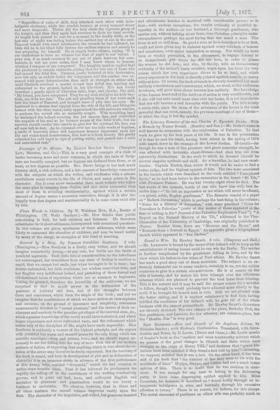Severed by a Ring. By Frances Geraldine Southern. 2 vols.
(Remington.)—Miss Southern is a lively, easy writer, and wo should imagine remarkably young,—at any rate, her faults are the faults of youthful aspirants. Such little bits of sensationalism as she introduces are extravagant, her transitions from one state of feeling to another so rapid, that we cannot but smile just when we ought to be in tears ; her doubts unfounded, her faith credulous, her wisdom somewhat trite, and her English very indifferent indeed, and partaking of those formal and old-fashioned turns of expression which are so common to beginners. Taking for granted, therefore the juvenility of the authoress, wo are surprised to find so much power in the delineation of the passions of jealousy and love, and of the struggles between them and conscience, which form the staple of the book ; and yet wo imagine that the youthfulness of which we have spoken at once explains and excuses, on the ground of ignorance and simplicity, references unnecessarily detailed to " carnal passions," and the causes of their ex- citement and mastery, to the peculiar privileges of the married state, &c., which a greater knowledge of the world would have restrained, and which larger experience and more cultivated taste, and the refinement which comes only of the discipline of life, might have made impossible. Miss Southern is evidently a woman of the highest principle, and she argues with youthful but warm and earnest power for the only thing which can sanctify marriage,—deep and intense love; and we should regret ex- tremely to see her fulling into the way of more than one of our modern authors of fiction, of supposing that anything which is true about the re- lation of the sexes may therefore be freely expressed. But the teaching of the book is sound, and both in development of plot and in delineation of character it is an immense stride in advance of the first performance of this young lady, entitled "Gwynedd," which we had occasion to notice some months since. That it has followed its predecessor too rapidly the falling-off in the carefulness of the writing conclusively proves, and to point out bad, loose, and colloquial English and mistakes in grammar and punctuation would bo too heavy a business to undertake. Wo observe, however, that in those and all other matters the second volume improves vastly upon the first. The character of the impulsive, self-willed, but generous-hearted and affectionate heroine is sketched with considerable power ; so is that—with curious exceptions, the results evidently of youthful in- equality in the author—of her husband, a thorough gentleman, who carries out, without talking about them, true Christian principles under circumstances perhaps the most trying that can assail a man. The lover is not so well done. So good a man as he is described to be at first, could not have given way to violence against every rule both of honour and conscience, oven under temptation so strong. Nor, would he have been so weakly persuaded, in the dam/meat, to engage himself to an insignificant girl whom ho did not love, in order to please the woman he did love ; and who, by-the-by, with an inconsistency evidently of the author's hasty creation, urges upon her lover the very course which her own experience shows to be so fatal, and which every argument in the book is directly pointed against, namely, to marry without love. Of course, the book abounds in cleverly conceived but most unlikely coincidences and contretemps, which, wo trust, as the authoress developos, will grow more clever because loss unlikely. Her knowledge of the human heart and of the motives of action is very considerable, and if she will but take much more time over her books, it is not improbable that she will become a real favourite with the public. The title is only- a catch-title, since the cause of the severance of the lovers is the most powerful that can exist, namely, the previous marriage of one of them-- of which the ring is but the symbol.


































 Previous page
Previous page